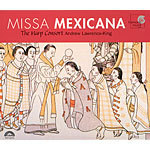
Missa Mexicana-music of (with free catalogue)
 $40.00
Out of Stock
$40.00
Out of Stockadd to cart
CABANILLES / CEREROLS / ESCALADA / GARCIA de ZESPEDES
Missa Mexicana-music of (with free catalogue)
Harp Consort / Andrew Lawrence-King
[ Harmonia Mundi / CD ]
Release Date: Saturday 1 April 2006
This item is currently unavailable via the quick and easy sources, but we’ll make enquiries for you. Please note - listed price is indicative only.
BBC Music Magazine - Best CDs of 2002
"Vivacious, breathtaking music…that left everyone speechless"(Il Corriere di Firenze, concert review)
***** Five Stars Pick of the Month BBC Music Magazine (October 2002)
"This is an intoxicating mix of European and Mexican, of sacred and secular, of voices and exotic instruments. A revelation not too be missed." (BBC Music Magazine)
BBC Music Magazine - Best CDs of 2002
Andrew Lawrence-King leads The Harp Consort in a vivid programme that juxtaposes an exuberant Mass by Juan Gutiérrez de Padilla with the Latin American and African folk-dances which inspired it. Discover the rich mixture of intellectualism and sensuality which characterized mid-17th-century Hispanic baroque.
* * * * * * * * * * * * * * * * * * * * * * * *
Fans of the very excellent Andrew Lawrence-King and his Harp Consort will need no second bidding to add this disc to their collection. The music in this well chosen programme has all the rhythmic flair and expressive impact of Lawrence-King's earlier issues, all sung and played with that understated elegance and sensitivity which lifts the spirits and coddles the soul.
Juan Gutiérrez de Padilla's 'Missa Ego flos campi' is the central work in the programme. In his informative booklet notes, Lawrence-King explains that Padilla's 'Parody Mass' is based on that composer's own motets, using and transforming a number of themes from these pieces (now lost), but taking considerable liberties with the liturgical texts. Padilla's mass music is as formal as it is dance based or related, and the other pieces on the CD are of dances connected to those used as models for the numbers of the mass. Thanks to the contemporary ambivalence of the church to the use of these dance-forms the connection of popular/secular music with that of the high church is a realistic one, although Lawrence-King states that this is in no way intended to be any kind of liturgical re-creation.
When looking at Mexican music of this period one can take as read that the principal influences come from Spain. This said, the various dance forms are peppered with Italian and Afro-Cuban and African influences. This latter source is clearly heard in the Cumbées, which would certainly not have sounded out of place in 'The Lion King.' All of this means that there is a surprising amount of contrast and variety in both musical styles and nuances of sound. A Conch shell is perhaps the most surprising of the instruments which appear here, but a satisfyingly rich battery of variously sized drums, percussion, shawms and sackbuts all add to the already intoxicating sound of baroque guitars, harps and continuo.
The vocal writing is also a fund of diversity, ranging from the polyphonic composition of the mass texts, to ballads like the wonderful Marizápalos bajó una tarde. All of the texts are fully given and translated into English, and, as in the case of the aforementioned Marizápalos are worth following (as Peter Kay would say, 'a bit of blue for the dads…').
In all this is an irresistible package for early music buffs and open-minded collectors of all kinds. It is beautifully recorded and performed, with some realistically muscular singing alongside the reduced-vibrato church styles. The sheer range of colour from both singers and ensemble put this production on a par with any previous prize-winners in this category, and it would greatly surprise me if this were to go unrecognised in 2006. I can only wonder as to why it took so long for this CD to appear on the shelves, but now that it is here I can only say how delighted I am to be able wholeheartedly to urge you all to go out and buy it.
Dominy Clements (Music Web UK)
Tracks:
Anonymous:
Marizápalos a lo humano: Marizápalos bajó una tarde
Juan Bautista José Cabanilles (1644 - 1712):
Xáacara Los que fueren de buen gusto
Joan Cererols (1618 - 1676):
Marizápalos a lo divino: Serafin que con dulce harmonía
Francisco Escalada :
Villancico Canten dos jilguerillos
Juan García de Zéspedes (1619 - 1678):
Guaracha Convidando está la noche
Juan Gutiérrez de Padilla (1590 - 1664):
Kirie [Missa Ego flos campi]
Gloria [Missa Ego flos campi]
Xácara: A la xácara xacarilla
Credo [Missa Ego flos campi]
Negrilla A siolo flasiquiyo
Sanctus [Missa Ego flos campi]
Agnus Dei [Missa Ego flos campi]
Santiago de Murcia :
Jácaras de la costa
Cumbées
Miguel Pérez de Zavala:
Diferencias sobre marizápalos
Francisco de Vidales (1702 - ):
Xáacara Los que fueren de buen gusto
